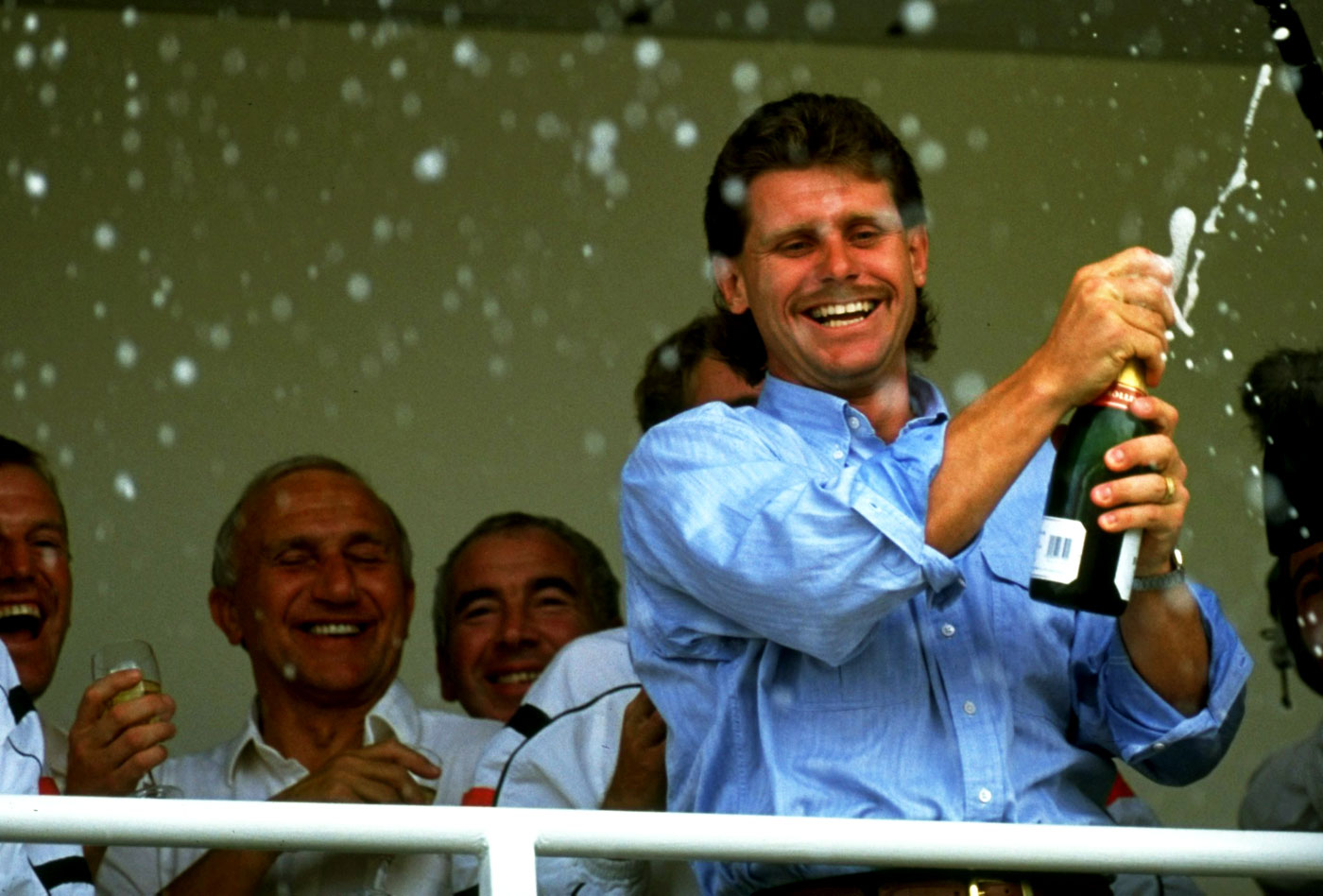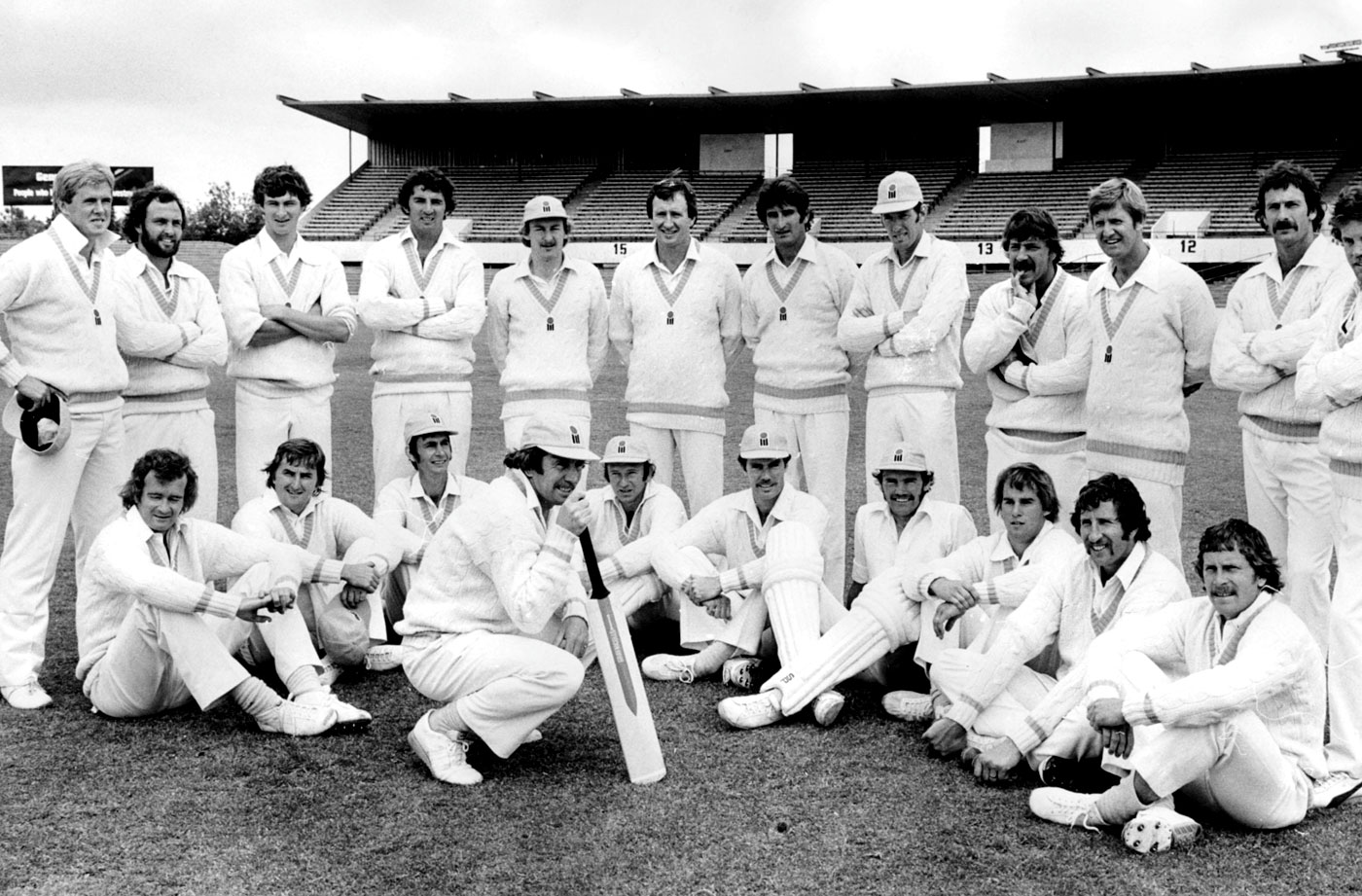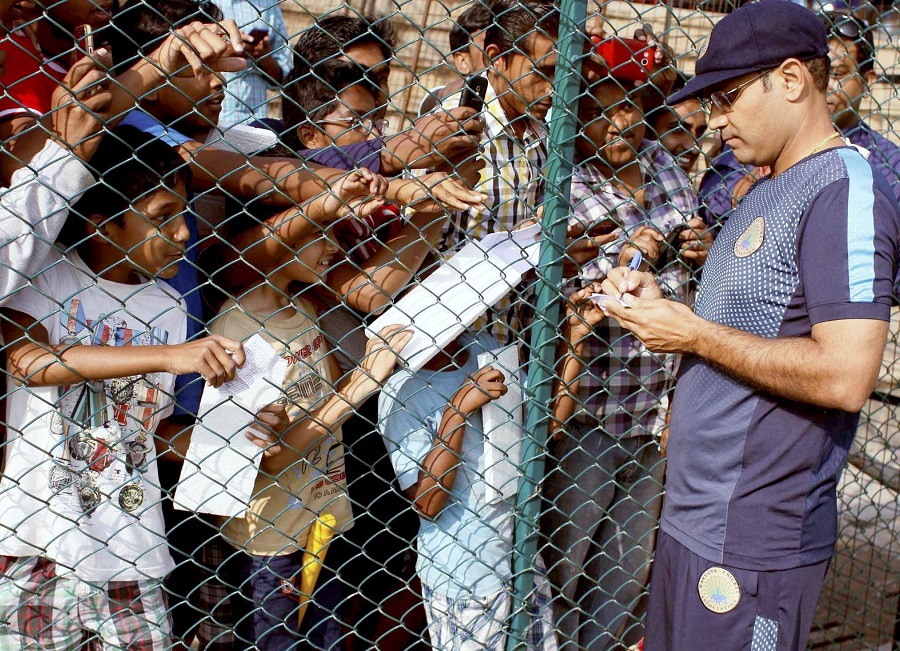Moniker mania

Robin Smith: could convict you with his hair © Getty Images
We'll start with some easy ones: Silver Billy, Tibby, Ticker, Atlas, Nugget, Gogga, The Cheese. These are a little harder: Dodge, Leaning Tower, Goofy, Shine, Cyril, Tank. Answers on page 50. If not instantly recognisable, they may at least sound familiar, which is the hallmark of a half-decent nickname: it trips off the tongue, worms its way into the memory and lodges there, a trigger of happy associations, a source of social binding. An individual sport in a team setting, cricket may have special need for such intimations of intimacy. It has certainly been rich in them.
Not that they're always a binding agent. William Hazlitt noted 200 years ago that a nickname is "the heaviest stone that the devil can throw at a man". Geoff Boycott would accept Thatch, a reference to his hair transplant, only from Ian Botham. The Cricketers' Who's Who entry for Boycott's Yorkshire contemporary John Hampshire used to warn: "Does not like being called Jackie." When John Bracewell joined Gloucestershire as coach, he sought to ban nicknames because they were "generally derogatory". And when Chris Adams drew Chris Tremlett to Surrey in 2010, he banned his vaguely uncomplimentary Hampshire alias, Goober.
These days, then, there is probably a little more sensitivity - and thus a little less colour and imagination. Recent England dressing-rooms have been a study in the solidarity of the suffix - Straussy, Cooky, Trotty, Swanny, Harmy, Colly, Broady - as an emblem of regimentation and mutuality. But nicknames still abound, and the relish of an apt one remains universal.
England is where the habit first caught on in sport, in the second half of the 18th century, when pioneering prizefighters such as "Gentleman John" Jackson and Henry "The Game Chicken" Pearce achieved renown. The instinct was alive and well on the playing fields of Hambledon, with fat "Lumpy" Stevens and dour "Old Everlasting" Walker among the dramatis personae. The custom of amateurs assuming names then became sufficiently evolved for Scores and Biographies to feature a list, the most famous of them still resonant today: Felix was in fact the cricket polymath Nicholas Wanostrocht, who turned his into a nom de plume for his canonical textbook Felix on the Bat.
| In 1930, Stan McCabe walked into Paris's Elyseé Palace Hotel as team-mates were discussing a portrait of Napoleon. They spotted a resemblance: thus Napper | |||
The custom probably also owed something to evolving public-school traditions. Two of the most famous and adhesive nicknames, Monkey for A. N. Hornby, and Buns for C. I. Thornton, originated at Harrow and Eton - Thornton's because in one school match he hovered beneath a catch at long leg while allegedly eating a bun. Of legend the chance was accepted; there was some dispute about the bun. "Some say he swallowed it, others that he dropped it, others again that he crammed it, jam and all, into his trousers pocket," reported Lord Harris. "Anyhow, it earned him his nickname."
Nicknames spread thanks to a growing mass-media profile, which secured for star players a range of glorious handles: John "The Little Wonder" Wisden, William "The Nonpareil Bowler" Lillywhite, Fuller "The Nonpareil Hitter" Pilch, Alfred "The Lion of Kent" Mynn, and at last W. G. "The Champion" Grace - a title he secured aged only 18. Yet quickly enough there emerged a distinction still worth drawing, between a public and a private nickname. On an everyday basis, Grace was seldom other than WG; and while Warwick Armstrong and Donald Bradman have gone down in history as The Big Ship and The Don, their team-mates preferred Clum and George.
It's a reminder that, when we refer to a player by his nickname, there is a degree of false intimacy. Ian Healy, Michael Bevan, Tim May and Michael Slater were Heals, Bevo, Maysie and Slats in public view, but Sav, Pilta, Doink and Sybil to colleagues. The last apparently betokened Slater's behaviour under the influence of alcohol, said to be as changeable as the character in the 1976 Sally Field TV series. Nicknames themselves, of course, express multiple personalities. For no reason other than that there are supposedly seven basic plots, seven deadly sins and seven habits of highly successful people, it seems only right to construct the following seven-sector taxonomy:
The alternative name Since Aristocles became Plato, in honour of his broad shoulders (platon meaning wide in Greek), and Marcus Tullius was Cicero, immortalising an ancestor's wart (cicer meaning chickpea in Latin), a small elite of nicknames have replaced given names completely. Thus Kim Philby, who took his name from Kipling's novel; and Capability Brown who, as he arrived at a design plan, would announce: "It is capable." Sport's most famous examples are Babe Ruth and Tiger Woods, but cricket has a surprising share: Patsy Hendren and Farmer White, Gerry Alexander and Collie Smith, Vinoo Mankad and Bapu Nadkarni. Jack Russell and Pommie Mbangwa seem entirely natural, while Boof has obtained such ubiquity in Australia we might have perhaps forgotten that the coach Lehmann's first name is Darren.

Which one is Rowdy? © Getty Images
The nickname based on a name Often enough, nicknames are simply word association: every Smith is a Smudger, every Miller a Dusty, every White a Chalky. Into this category fall Arnold "Ob" Long, Allan "Legga" Lamb, Peter "Sounda" Sleep, Steven "Bumpy" Rhodes, Graham "Picca" Dilley, and "Ho Chi" Min Patel. An early example is the cricketing cleric Rev. E. T. Drake, known as The Sacred Bird when he represented Cambridge in the 1850s. A personal favourite is Gloucestershire's Paul Romaines: Human. Initials have been relied on, too: Chris "Chilly" Old (from C. Old), Graham "Horse" Arnold (from G. G.), and Simon "Sod" O'Donnell. Once in a while, inspiration derives merely from the flavour of a name. Ian Meckiff became The Count when teammates at Victoria thought his surname savoured of a Transylvanian aristocrat; Dennis Yagmich became Comrade when South Australian colleagues decided he sounded like something from the Kremlin.
The nickname based on a physical characteristic Maybe you're short, like Alfred "Tich" Freeman; or tall, like "Long John" Tunnicliffe; or big, like Ian "Beefy" Botham (original England nickname Guy, after the gorilla). Tony Greig's long legs put team-mates in mind of clothes (or wash) pegs, hence Washies; and Bruce Yardley's rangy physique made for Roo Dog, eventually shortened to Roo. In the case of Herbert "Ranji" Hordern, Graham "Zap" Gooch and Jack "Musso" Badcock, the factor was imagined physical resemblance to another: Ranjitsinhji, the insurrectionary Emiliano Zapata, and the generalissimo Benito Mussolini. A resemblance need only be fleeting: Keith Fletcher's abiding nickname Gnome apparently originated from shoes he wore into the Essex dressing-room as an 18-year-old that curled up at the toe. And it now wouldn't matter whether Robin Smith ended up bald as a coot, because everyone would remember the crinkly hair, like a judicial wig, that gave rise to The Judge.
The nickname based on playing reputation or other on-field characteristic The Victorians started this. Despite their clichéd staidness, they liked scaring themselves and each other: thus Frederick "The Demon" Spofforth, and John "The Fiend" Ferris. The Edwardians preferred pomp and circumstance: thus Charlie Macartney's moniker of The Governor-General, for his manner of dismissing bowlers "like footmen". Ever since, whether you bowl fast (Frank "Typhoon" Tyson, or Norman "Flash" Cowans), or bat slowly (Trevor "Barnacle" Bailey, or Mark "Rig" - as in rigor mortis - Richardson), something obvious has usually awaited.
| These days, then, there is probably a little more sensitivity - and thus a little less colour and imagination. Recent England dressing-rooms have been a study in the solidarity of the suffix - Straussy, Cooky, Trotty, Swanny, Harmy, Colly, Broady | |||
Some of these have parallels with other sports. Ice hockey got in with Gordie "Mr Hockey" Howe and Bernie "Boom Boom" Geoffrion before cricket had Mike "Mr Cricket" Hussey and Shahid "Boom Boom" Afridi. But Bill O'Reilly and the Nawab of Pataudi had earned their shared mantle of Tiger before golf's Woods was rechristened by his father as an injunction always to fight - the biggest fight, perhaps, being against his actual names Eldrick Tont.
Occasionally, a nickname commemorates a technical or temperamental tic: Sticker reported Harry Donnan's reluctance to leave the crease, Toey noted Hugh Tayfield's preliminary kick of the turf before running in to bowl, and Tiddleypush celebrated Wilf Barber's single-hunting. Every so often, the resemblance is even to another cricketer, from William "Barlow" Carkeek stonewalling like Dick Barlow, and Stuart "Sarf" Clark's Sarfraz Nawaz-like delivery stride. The emulation of Steve "Tugga" Waugh and Darren "Boof" Lehmann by Justin "Mini Tugga" Langer and Mark "Baby Boof" Cosgrove arguably helped the originals more than the protégés.
The nickname based on off-field reputation and demeanour Dressing-rooms and hotels are a cricket habitat as natural as a playing field: Colin "Kipper" Cowdrey and Phil "The Cat" Tufnell both enjoyed a snooze. His old world courtesy had Bob Taylor named Chat; his boisterous mischief saw Merv Hughes dubbed Fruitfly (the great Australian pest); David Steele's short arms and deep pockets were reflected in Crime (doesn't pay); Joe Denly's cheerful willingness to debag in No Pants. And since the dressing-room is a great leveller, anything bucking the trend is noted. Well-spoken Ed Smith and Matthew Fleming both answered to Jazzer, short for Jazz Hat; originally Johann, Andrew Strauss became Lord Brocket, in the spirit of "Lord Ted" Dexter; regal Brian Lara became The Prince, which might conceivably also have been an allusion to Macchiavelli. Every so often, a nickname will derive from a single story. In 1930, Stan McCabe walked into Paris's Elyseé Palace Hotel as team-mates were discussing a portrait of Napoleon. They spotted a resemblance: thus Napper. In 2004, Shaun Tait was unable to explain his Christian name to a Sri Lankan desk clerk, whose transliteration caused amusement: thus Sloon. "You're Eric Gilchurch," said a young autograph hunter to Adam Gilchrist at Derby in 1997: thus Churchy. Most esoteric of all was the tag worn by Peter Lever, deriving from his Times crossword rivalry with Lancashire team-mate David Green: Plank was apparently the decisive word in one of their lexical showdowns.

Viru short for... you guessed it © PTI
The antithetical nickname This is an Australian speciality, in the tradition of calling someone tall Shorty, or someone short Lofty. Hugh Trumble was cut down to size with Little Eva (from Uncle Tom's Cabin); Charlie McLeod's slow amiability and Bert Ironmonger's unpolished manner were evoked by Lightning and Dainty; the dead bats of Ken Mackay and Paul Hibbert were brought to life by Slasher and Dasher. "Shut up ya rowdy bugger," exclaimed South Australian captain Barry Jarman after twelfth man Ashley Mallett did not open his mouth over the first three days of a Sheffield Shield match: Rowdy the stripling youth became. Years later, Chris Tavaré followed suit.
The nickname from popular culture Cricketers apparently watch a lot of American television: Craig "Bilko" Serjeant, Stuart "LA" Law, and Michael "Maxy" Klinger, from the gender-bending Corporal Max Klinger in M*A*S*H. Childhood years in front of the box seem to leave a particular mark: thus David "Bumble" Lloyd (inspired by Michael Bentine's The Bumbles), Greg "Fat Cat" Ritchie (the Australian series Fat Cat & Friends), Joel "Big Bird" Garner (Sesame Street), Dilip "Joe 90" Doshi (Joe 90), and Michael "Virgil" Vaughan (Thunderbirds). Aussies have also shown a conversance with comic strips: Gordon "Lothar" Rorke, Bill "Phantom" Lawry, and Martin "Super" Kent. Cinema, by comparison, seems relatively underrepresented. Frank "Tarzan" Misson had a physique to rival Johnny Weissmuller's, and Colin "Ollie" Milburn one reminiscent of Oliver Hardy; Australians claimed to see Depardieu in South Africa's Brian "Gérard" McMillan, and buck-toothed actor Chris Owen from the American Pie franchise in England's Ian "The Sherminator" Bell. Popular music references, too, have remained fairly mainstream: from Graeme "Beatle" Watson to Stuart "Westlife" Broad.
Not surprisingly, perhaps, the popular culture with broadest appeal to cricketers has probably been sport, whether boxing (Smokey for Viv Richards, after "Smokin' Joe" Frazier), athletics (Chris "Carl" Lewis), horse racing (Derek "Arkle" Randall) and various footballs (Stan for Ole Mortensen, Alfie for Justin Langer). Middlesex team-mates of Wayne Daniel anointed him The Black Diamond, a nickname shared with the boxer Tom Cribb and Brazilian footballer Leônidas da Silva.
What to make of this brief survey? Cricket nicknames are, I suspect, one of those institutions always said to be in decline, under assault from forces of homogeneity. But maybe that's not so bad. It seems preferable to the trend among high-profile American athletes, whose nicknames are now barely distinguishable from brand names - His Airness for Michael Jordan, and The Answer for Allen Iverson, deriving directly from their footwear contracts with Nike and Reebok.
Striving to mint their own Manassa Mauler (Jack Dempsey) and Flying Finn (Paavo Nurmi, among others), India's excitable media bestowed refabricated epithets: The Little Master for Sachin Tendulkar, Captain Cool for M. S. Dhoni, The Turbanator for Harbhajan Singh, the Sultan of Multan for Virender Sehwag. Yet there's something strangely pleasing that, within the precincts of the dressing-room, that quartet remained Tendlya, Mahi, Bhajji and Viru; in fact, as evidenced by Yuvraj "Yuvi" Singh, Zaheer "Zak" Khan and Ravindra "Jaddu" Jadeja, India has scarcely stretched itself in the nickname stakes.
Nothing in cricket today seeming beyond price, perhaps the time will come when a royalty is due to players every time their nickname is used. But not, thankfully, yet.
Gideon Haigh is a journalist. In his 20 years with the Yarras, a Melbourne club team, he has been variously known as Artist, Tragic, and War Crimes.
The answers: Silver Billy William Beldham, Hambledon; Tibby Albert Cotter, Australia; Ticker Arthur Mitchell, England; Atlas George Headley, West Indies; Nugget Keith Miller, Australia; Gogga Paul Adams, South Africa; The Cheese Matt Prior, England; Dodge William Whysall, England; Leaning Tower Clairmonte Depeiza, West Indies; Goofy Godfrey Lawrence, South Africa; Shine Dave Renneberg, Australia; Cyril Graham Roope, England; Tank Trevor Barsby, Queensland

